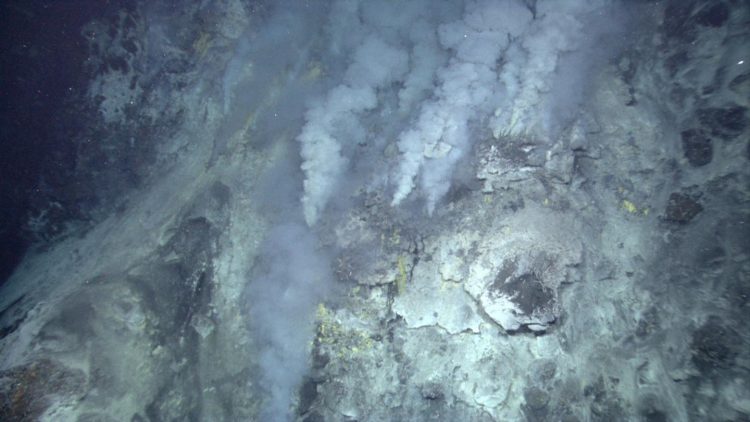Scientists research deep-sea hydrothermal vents, find carbon-removing properties

This NOAA image shows a deep ocean hydrothermal vent. Credit: NOAA Okeanos Explorer Program, INDEX-SATAL 2010
Hydrothermal vents are hotspots of activity on the otherwise dark, cold ocean floor. Since their discovery, scientists have been intrigued by these deep ocean ecosystems, studying their potential role in the evolution of life and their influence upon today's ocean.
Stubbins and his colleagues were most interested in the way the vents' extremely high temperatures and pressure affect dissolved organic carbon. Oceanic dissolved organic carbon is a massive carbon store that helps regulate the level of carbon dioxide in the atmosphere–and the global climate.
Originally, the researchers thought the vents might be a source of the dissolved organic carbon. Their research showed just the opposite.
Lead scientist Jeffrey Hawkes, currently a postdoctoral fellow at Uppsala University in Sweden, directed an experiment in which the researchers heated water in a laboratory to 380 degrees Celsius (716 degrees Fahrenheit) in a scientific pressure cooker to mimic the effect of ocean water passing through hydrothermal vents.
The results revealed that dissolved organic carbon is efficiently removed from ocean water when heated. The organic molecules are broken down and the carbon converted to carbon dioxide.
The entire ocean volume circulates through hydrothermal vents about every 40 million years. This is a very long time, much longer than the timeframes over which current climate change is occurring, Stubbins explained. It is also much longer than the average lifetime of dissolved organic molecules in the ocean, which generally circulate for thousands of years, not millions.
“However, there may be extreme survivor molecules that persist and store carbon in the oceans for millions of years,” Stubbins said. “Eventually, even these hardiest of survivor molecules will meet a fiery end as they circulate through vent systems.”
###
Hawkes conducted the work while at the Research Group for Marine Geochemistry, University of Oldenburg, Germany. The study's co-authors also included Pamela Rossel and Thorsten Dittmar, University of Oldenburg; David Butterfield, University of Washington; Douglas Connelly and Eric Achterberg, University of Southampton, United Kingdom; Andrea Koschinsky, Jacobs University, Germany; Valerie Chavagnac, Université de Toulouse, France; and Christian Hansen and Wolfgang Bach, University of Bremen, Germany.
The study on “Efficient removal of recalcitrant deep-ocean dissolved organic matter during hydrothermal circulation” is available at http://www.
Media Contact
All latest news from the category: Earth Sciences
Earth Sciences (also referred to as Geosciences), which deals with basic issues surrounding our planet, plays a vital role in the area of energy and raw materials supply.
Earth Sciences comprises subjects such as geology, geography, geological informatics, paleontology, mineralogy, petrography, crystallography, geophysics, geodesy, glaciology, cartography, photogrammetry, meteorology and seismology, early-warning systems, earthquake research and polar research.
Newest articles

Webb captures top of iconic horsehead nebula in unprecedented detail
NASA’s James Webb Space Telescope has captured the sharpest infrared images to date of a zoomed-in portion of one of the most distinctive objects in our skies, the Horsehead Nebula….

Cost-effective, high-capacity, and cyclable lithium-ion battery cathodes
Charge-recharge cycling of lithium-superrich iron oxide, a cost-effective and high-capacity cathode for new-generation lithium-ion batteries, can be greatly improved by doping with readily available mineral elements. The energy capacity and…

Novel genetic plant regeneration approach
…without the application of phytohormones. Researchers develop a novel plant regeneration approach by modulating the expression of genes that control plant cell differentiation. For ages now, plants have been the…





















